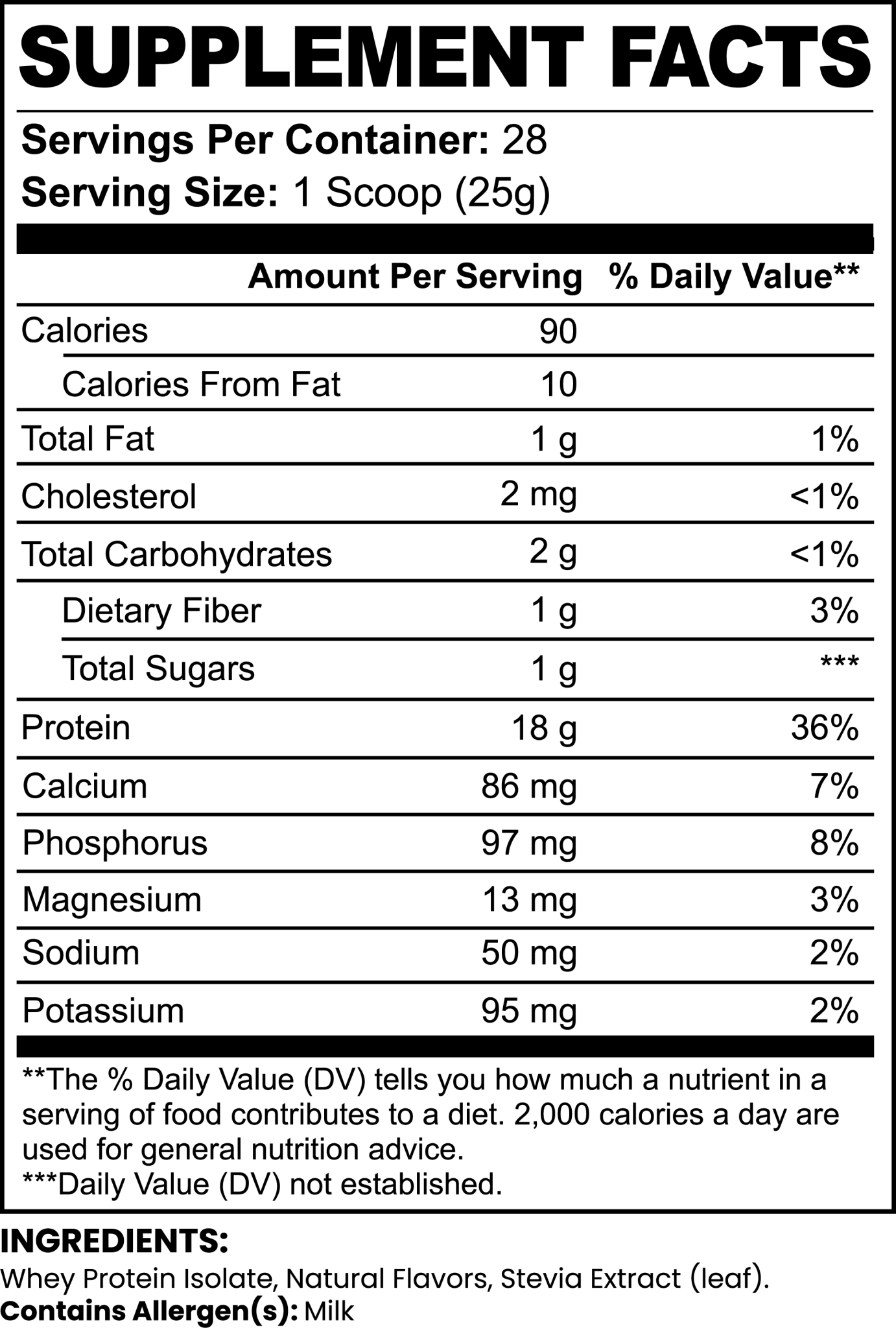NKD 100% Whey Protein Isolate
NKD 100% Whey Protein Isolate
Couldn't load pickup availability
Pure Performance with Raw & Clean Whey Protein Isolate
Unleash potential with NKD Whey Protein Isolate—a no-nonsense, high-impact workout fuel designed without limits.
NKD is protein in its purest form. Raw. Clean. Stripped down to the bare essentials. Just what your body needs to recover faster, build lean muscle, and dominate every workout. Every scoop delivers a powerhouse of 22g of pure whey protein isolate—the cleanest, most bioavailable form of protein on the market. Forget the fillers, forget the b.s. This is performance fuel with minimal fat, minimal lactose, and maximum muscle-building power.
Get NKD before anything else...
Get NKD before anything else...
22g of high-quality whey protein isolate per serving for lean muscle growth and rapid recovery.
No added sugars, no artificial sweeteners, and no unnecessary fillers.
Keto-friendly, gluten-free, with minimal fat and lactose - perfect for clean bulking or cutting phases.
Keeps you feeling fuller, longer—helping to manage weight and support fat loss.
Built for Peak Performance
Built for Peak Performance
This isn't just protein. It's your edge. Whether you're crushing heavy lifts, grinding through HIIT sessions, or pushing through endurance training, NKD Whey Protein Isolate gives you the clean fuel your body demands. Smooth, non-gritty, and effortless to mix—blend it with water, almond milk, or toss it into your post-workout smoothie for a nutrient-packed boost.
NKD natural chocolate or vanilla flavor hits smooth and rich, sweetened with stevia extract—a plant-based, calorie-free sweetener that keeps it clean without sacrificing taste. No artificial junk. Just bold, natural flavor to power up your day.
Product Info
Product Info
Ingredients: Whey Protein Isolate, Natural Flavors, Stevia Extract (leaf).
Flavor: Chocolate or Vanilla
Collection: Kodiak Gold Elite Proteins, The Kodiak Gold Supplement Catalogue
Pairs With: K2 100% Pure Creatine, Omni Hi-Potency Multivitamin, Pump Energy Strips
NON-GMO - GLUTEN FREE - VEGETARIAN
Suggested use: As a dietary supplement, adults mix one (1) scoop with 6-8 oz. of water or favorite beverage daily. For best results, take 20-30 minutes before a meal with 8 oz. of water or as directed by your healthcare professional.
Manufacturer's country: USA
Product amount: 24.7oz/700g
Gross weight: 2.04lb/925g
Warning: Do not exceed recommended dose. Pregnant or nursing mothers, children under the age of 18, and individuals with a known medical condition should consult a physician before using this or any dietary supplement. KEEP OUT OF THE REACH OF CHILDREN. DO NOT USE IF SAFETY SEAL IS DAMAGED OR MISSING. STORE IN A COOL, DRY PLACE.
*The Food and Drug Administration (FDA) has not evaluated the benefits but has approved the product as safe for its intended use. This product is not intended to diagnose, treat, cure or prevent any disease.





Lean Muscle FAQ
The Science of Building Lean Muscle
1. Importance of Muscle Building:
Muscle building enhances day-to-day functionality, improves life quality, and slows down aging. It should be viewed as strength training rather than just bulking up.
2. Muscle Hypertrophy:
Myofibrillar Hypertrophy: Increases the number of myofibrils, leading to greater strength.
Sarcoplasmic Hypertrophy: Increases fluid in muscle cells, giving a larger appearance but not directly increasing strength.
3. Mechanisms of Muscle Growth:
Mechanical Tension: Stress on muscles during contraction, such as lifting weights.
Muscle Damage: Micro-damage from unfamiliar movements or increased exercise intensity, leading to muscle soreness.
Metabolic Stress: Build-up of metabolites causing the 'burn' sensation, signaling the release of anabolic hormones like testosterone and growth hormone.
4. Hormonal Influence:
Anabolic hormones and insulin-like growth factor (IGF-1) are crucial for muscle repair, growth, and recovery. They also regulate satellite cells responsible for muscle hypertrophy and regeneration.
5. Factors Affecting Muscle Growth:
Genetics, age, gender, body composition, nutrition, sleep, and lifestyle all play roles in muscle development. Simply lifting heavier weights isn't enough to cause significant changes without considering these factors.
6. Science-Backed Tips for Building Lean Muscle:
Calorie Surplus: Eat more calories than you burn to support muscle growth.
Protein Intake: Consume 0.6-0.8 grams of protein per pound of body weight to stimulate muscle protein synthesis.
Avoid Low-Carb Diets: Carbs are essential for energy, recovery, and preventing fatigue.
Increase Training Volume: Gradually increase the total amount of exercise done to promote muscle growth.
Compound Exercises: Use exercises that engage multiple joints and muscle groups for a higher anabolic response.
Progressive Overload: Continuously challenge muscles by increasing volume, reducing rest periods, increasing resistance, or time under tension.
7. Continuous Journey:
Building muscle is a continuous journey that requires realistic goals and consistency. Focus on getting stronger and more active for long-term success.
How long does it take to gain lean muscle?
Consistency in working out, proper nutrition, and strategic use of supplements like creatine are essential components for muscle growth. Beginners can expect to see noticeable muscle growth within eight weeks, while experienced lifters might see changes in three to four weeks. With the right strength training and nutrition plan, most individuals gain one to two pounds of lean muscle per month.
Consistency in Workouts
Consistency in workouts is crucial for muscle development. Regular strength training stimulates muscle hypertrophy through mechanical tension, muscle damage, and metabolic stress. For optimal results, it's recommended to train each muscle group at least twice a week. Progressive overload, which involves gradually increasing the weight, reps, or sets, is key to continuously challenging muscles and promoting growth. Tracking your progress and maintaining a structured workout plan ensures sustained improvements over time.
Proper Nutrition
Proper nutrition supports muscle recovery and growth. Consuming a slight calorie surplus helps create an anabolic environment conducive to muscle gain. Protein is particularly important, as it provides the amino acids necessary for muscle repair and synthesis. A daily intake of 0.6-0.8 grams of protein per pound of body weight is generally recommended. Incorporating protein-rich foods such as lean meats, fish, eggs, and dairy, as well as plant-based options like beans and legumes, ensures adequate protein intake. Carbohydrates are also essential as they replenish glycogen stores and provide the energy needed for intense workouts.
Sports Supplements
Supplements can enhance muscle growth when combined with consistent training and proper nutrition. Creatine, one of the most researched and effective supplements, increases phosphocreatine stores in muscles, allowing for improved performance during high-intensity exercise. This can lead to greater strength and muscle mass over time.
Achieving muscle growth involves a combination of consistent strength training, proper nutrition, and strategic supplementation. By maintaining a regular workout schedule, eating a balanced diet rich in protein and carbohydrates, and incorporating supplements like creatine, individuals can maximize their muscle growth and overall fitness. Remember, patience and persistence are key, as muscle development is a gradual process requiring dedication and effort.
How many reps for lean muscle?
To build or maintain muscle while shedding body fat, it's essential to focus on hypertrophic training. This means lifting weights in the optimal range for muscle growth. Aim for 3-5 sets of 8-12 reps, with 60-120 seconds of rest between each set. This approach maximizes muscle hypertrophy and ensures your strength training efforts are efficient and effective.
By consistently working within this rep range, you'll stimulate muscle fibers, promote growth, and help preserve lean mass even as you reduce body fat.
How to turn belly fat into muscle?
Myth Busting: Fat vs. Muscle
It's a common misconception that fat can turn into muscle. In reality, during weight loss, fat is broken down from fat cells to produce energy, while muscle is preserved through strength training and a protein-rich diet.
To achieve sustainable, long-term weight loss, incorporate both cardio and strength training into your routine 5-7 days a week. Focus on consuming a diet rich in whole, minimally processed foods to support your fitness goals.
Although losing weight and gaining muscle requires dedication, your body will adapt and respond positively with consistent effort. Embrace the journey, knowing that each step brings you closer to a healthier, stronger you.
What can slow down my gains?
1. Focusing on Form
Perfect form is vital for effective workouts and injury prevention. Prioritize doing fewer reps correctly rather than more reps with poor technique. This ensures you engage the right muscles and make steady progress.
2. Skipping the Cool Down
Cooling down is crucial after every workout to help your muscles recover and prevent stiffness. Skipping this step might save time, but it won't save your muscles. Always include a few minutes of light stretching and deep breathing.
3. Neglecting Hydration
Proper hydration is essential for regulating body temperature, muscle contractions, and joint lubrication. Dehydration can lead to fatigue, nausea, and poor concentration. Always keep a full water bottle handy to stay hydrated throughout your workout.
4. Overdoing It
Progress takes time, and overexerting yourself can lead to overtraining and injury. Increase weights gradually and know your limits to ensure safe and effective workouts. Remember, consistency and gradual progress are key to long-term success.
5. Taking Long Rest Periods
Shorter rest periods keep your heart rate up and maximize muscle gains. Avoid distractions like checking social media between sets. Staying focused and maintaining a steady pace will make your workouts more efficient.
6. Not Tracking Progress
But don't get overtly consumed by how much, how many reps and when. Some days are great days and some days are garbage. If every week, month and year, you're making progress, then thats perfect. Tracking in a note book or taking a photo every couple of months is great for looking back on but it's not the end all.
7. Skipping Proper Nutrition
A balanced diet is essential for fueling your workouts and aiding recovery. Focus on whole, minimally processed foods and ensure you get enough protein. Proper nutrition supports muscle growth and overall fitness.





